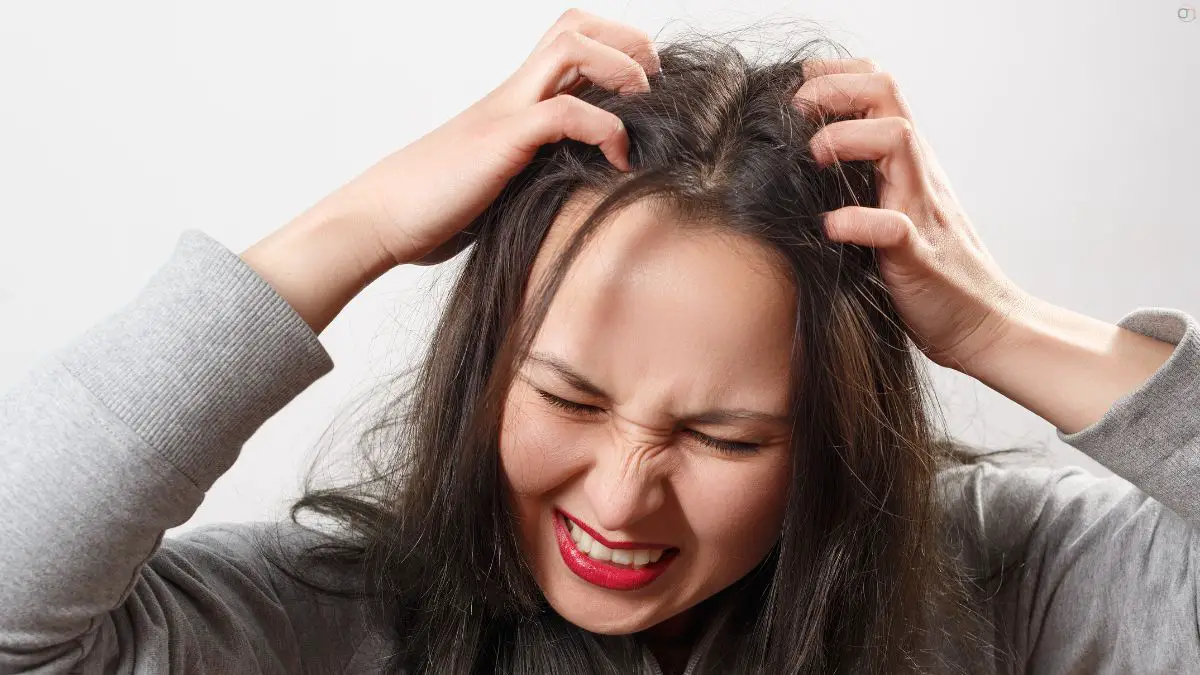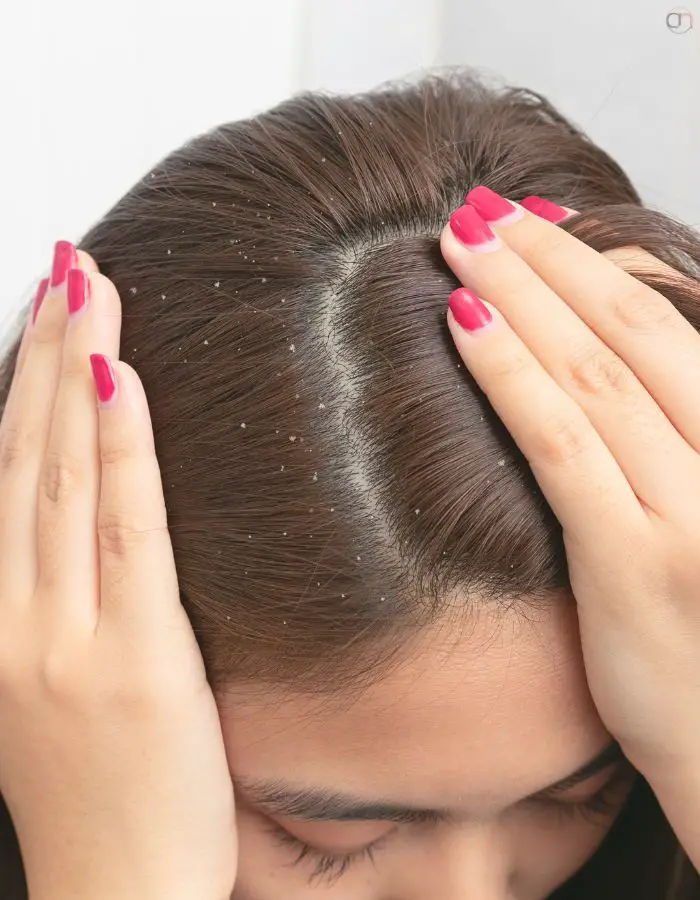Home Remedies For Dandruff And Itchy Scalp

Dealing with dandruff and an itchy scalp can be frustrating and uncomfortable, but the good news is that effective solutions are often right in your kitchen.
Home remedies offer natural, affordable, and safe alternatives to commercial treatments, helping to soothe irritation and reduce flakes.
Ingredients like coconut oil, aloe vera, apple cider vinegar, and tea tree oil have been used for years to treat scalp issues.
Get 5 Home remedies for dandruff and itchy scalp for tackling dandruff and calming an itchy scalp, so you can achieve healthier, more comfortable hair and skin naturally & join us.
Causes of Dandruff and Itchy Scalp:
Dandruff and an itchy scalp can be caused by a variety of factors, ranging from simple dryness to underlying skin conditions. Understanding the causes is key to finding the right treatment. Here are the most common reasons behind dandruff and scalp irritation:
1. Dry Skin
One of the most common causes of an itchy scalp and dandruff is dry skin. In colder months, the lack of moisture in the air can cause the skin on your scalp to dry out, leading to flaking and itching.
2. Seborrheic Dermatitis
This condition, which is a more severe form of dandruff, is caused by an overproduction of oil on the scalp. It results in an itchy, red, inflamed scalp with greasy flakes. Seborrheic dermatitis is often triggered by stress or hormonal changes.
3. Malassezia Fungus
Malassezia is a yeast-like fungus that naturally lives on the scalp. In some people, it can overgrow, feeding on the oils produced by the scalp, leading to dandruff and irritation. This fungal imbalance causes itching and the shedding of skin cells.
4. Sensitivity to Hair Products
Certain shampoos, conditioners, or hair treatments contain harsh chemicals, fragrances, or preservatives that can irritate the scalp. Sensitivity or allergic reactions to these ingredients can lead to scalp dryness, itching, and dandruff.
5. Poor Scalp Hygiene
Not regularly washing your hair can lead to the buildup of dead skin cells, oil, and hair products, which can clog hair follicles and cause itching. This buildup may also contribute to the growth of dandruff-causing fungi.
6. Dietary Deficiencies
A lack of certain vitamins and nutrients, such as zinc, vitamin B, and omega-3 fatty acids, can affect the health of your skin and scalp. Poor diet can make your scalp more prone to dryness, irritation, and dandruff.
7. Stress
Stress can trigger or worsen dandruff. When stressed, the body produces more oil, which can lead to an overgrowth of Malassezia and exacerbate dandruff symptoms. Stress may also impact your immune system, making it harder for the body to fight off fungal infections on the scalp.
8. Environmental Factors
Harsh weather, such as cold, dry air or excessive heat, can dry out the scalp, leading to flakiness and itching. Pollution and allergens in the environment can also irritate the scalp, contributing to dandruff.
9. Underlying Skin Conditions
Conditions like psoriasis, eczema, and other autoimmune disorders can lead to dandruff-like symptoms. These conditions cause the skin to shed cells at an accelerated rate, leading to flakes and an itchy scalp.
If it’s making adjustments to your hair care routine or consulting a dermatologist for underlying conditions, the right treatment depends on identifying the root cause of the problem.
5 Home remedies for dandruff and itchy scalp:
If you’re struggling with dandruff and an itchy scalp, there are several natural remedies you can try at home to soothe and treat the condition. These Home remedies for dandruff and itchy scalp are gentle on the skin, easy to prepare, and often very effective in reducing flakes and irritation.
1. Coconut Oil
- Why it works: Coconut oil is a natural moisturizer that helps hydrate dry scalp skin, which is a common cause of dandruff. It also has antimicrobial properties that can help reduce fungal growth, which can contribute to dandruff.
- How to use: Warm up a small amount of coconut oil and massage it gently into your scalp. Leave it on for 20-30 minutes, or overnight if possible, then rinse out with a mild shampoo. Repeat 2-3 times a week for best results.
2. Apple Cider Vinegar
- Why it works: Apple cider vinegar (ACV) helps restore the pH balance of your scalp, which can prevent the growth of dandruff-causing fungi. It also works as an exfoliant, breaking down dead skin cells.
- How to use: Mix equal parts of apple cider vinegar and water in a spray bottle. After shampooing, spray the solution onto your scalp and massage it gently. Leave it for 5-10 minutes, then rinse thoroughly with water. Use this remedy once or twice a week.
3. Aloe Vera
- Why it works: Aloe vera is well-known for its soothing and anti-inflammatory properties, making it perfect for calming an itchy scalp. It also hydrates the scalp, which helps reduce dryness that can lead to dandruff.
- How to use: Extract fresh aloe vera gel from the plant and apply it directly to your scalp. Leave it on for 20-30 minutes, then rinse it off with warm water. Repeat 2-3 times a week for relief from itching and flakes.
4. Tea Tree Oil
- Why it works: Tea tree oil has natural antifungal and antibacterial properties that help combat the fungi that often cause dandruff. It also helps reduce scalp inflammation and itching.
- How to use: Dilute tea tree oil with a carrier oil like coconut or olive oil (around 5-10 drops per tablespoon). Massage the mixture into your scalp and leave it on for 15-20 minutes before washing it out with a mild shampoo. Use this treatment 1-2 times a week.
5. Lemon Juice
- Why it works: The natural acidity of lemon juice helps balance the scalp’s pH, which can reduce dandruff. It also has antiseptic properties that help clean the scalp and reduce itching.
- How to use: Squeeze fresh lemon juice and massage it into your scalp for a few minutes. Leave it on for 5-10 minutes before rinsing with warm water. For best results, you can combine lemon juice with a little honey or olive oil to help moisturize the scalp. Use 2-3 times a week.
However, if the condition persists or worsens, it’s best to consult a dermatologist to rule out any underlying skin conditions or infections.
Tips for Maximizing Results:
To get the most out of your home remedies for dandruff and an itchy scalp, it’s important to not only follow the treatments but also adopt healthy scalp care habits. Here are some essential tips to maximize the effectiveness of your dandruff treatments:
1. Maintain a Consistent Routine
Consistency is key when treating dandruff. Whether you’re using coconut oil, apple cider vinegar, or any other remedy, make sure to apply it regularly (1-3 times a week) for the best results. Skipping treatments may slow down progress.
2. Avoid Harsh Hair Products
Strong shampoos and hair products containing sulfates, alcohol, or artificial fragrances can dry out your scalp and worsen dandruff. Opt for gentle, sulfate-free shampoos and conditioners, preferably formulated for sensitive scalps.
3. Use Lukewarm Water
Hot water can strip the scalp of its natural oils, making it even drier and more prone to flakes. Always wash your hair with lukewarm water to avoid drying out your scalp while cleansing.
4. Massage Your Scalp Gently
When applying treatments, gently massage your scalp with your fingertips. This helps increase blood circulation to the scalp, improves absorption of remedies, and encourages healthy hair growth.
5. Avoid Scratching
Scratching an itchy scalp may provide temporary relief but can lead to further irritation or even infection. Try not to scratch, and instead, use soothing remedies to calm the scalp. If itching persists, a professional diagnosis may be necessary.
6. Use a Humidifier
Dry indoor air, especially in winter, can contribute to scalp dryness and dandruff. Using a humidifier in your home can help keep the air moist and prevent your scalp from becoming too dry.
7. Eat a Balanced Diet
A healthy diet plays a vital role in scalp health. Include foods rich in omega-3 fatty acids, zinc, and vitamins A, D, and E to nourish your scalp from the inside. Drinking plenty of water is essential for keeping your skin and scalp hydrated.
8. Limit Heat Styling
Excessive use of blow dryers, flat irons, and curling irons can damage your scalp and hair. Minimize the use of heat-styling tools, and always use a heat protectant spray when styling to reduce damage and dryness.
9. Be Patient
Treating dandruff takes time. While natural remedies can show noticeable improvements within a few weeks, it may take longer for persistent dandruff or severe scalp irritation to resolve completely. Be patient and consistent with your care.
If dandruff persists despite your efforts, consulting a dermatologist will help identify any underlying conditions.
Read Next: How To Treat Dandruff With Vinegar






